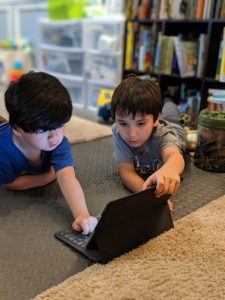 On Friday I arrived at Joey’s house to find that his eye gaze wasn’t working. For whatever reason, it was not picking up his eye gaze no matter how hard he stared at it. After tinkering with it for awhile, we reluctantly decided to have a low-tech session.
On Friday I arrived at Joey’s house to find that his eye gaze wasn’t working. For whatever reason, it was not picking up his eye gaze no matter how hard he stared at it. After tinkering with it for awhile, we reluctantly decided to have a low-tech session.
It’s always sad to realize just how fragile Joey’s ability to share his thoughts and opinions is, and just how much of his day to day work depends on the stars aligning and the technology working.
We had a great session, and worked through so much academics, partly because Joey was not able to get off topic, tell me he was bored, or request to change activities. It is tempting to feel like that hour of one sided communication was more productive than ones when Joey is able to talk. And yet, a large part of Joey was missing from our session.
We worked on identifying his sight words receptively, read books and counted. I dictated what we did, and we checked through each box. Sure, we got a lot done, but how much did Joey actually get out of it? Not able to tell me he thought a story was silly or boring, or even to tell me he could hear the helicopter outside, he fell quiet and went along with our lesson. We know students need to be engaged to learn, and I couldn’t help feeling that Joey was demonstrating active listening skills but not actually doing so. (We all mastered this in college, right? I’m nodding along with the professor, yes, I agree with what you say… then provide a curious facial expression, without actually following along with the lecture.)
The experience was a reminder of how important it is as educators for us to honor our students’ voices, even when those voices are inconvenient. It would be easy to take away Joey’s words for part of our sessions and drill some of the high frequency words he thinks are boring. Yet I could not do this to my own kindergarten daughter, who is working on learning the same words as Joey. If she is able to tell me she’s tired, and then to observe that love, like, and look all start with the same letter, then Joey should be too. We learn from making critical observations of the world around us, and being able to share them with others increases our engagement and likelihood of following through on our critical thinking. Although we whizzed through our words on Friday, with Joey touching the words as I said them, this was not ideal. We didn’t have Joey’s voice to hear his thoughts.
Instead of turning off our students’ voices to accomplish tedious academic work, we need to teach expectations and set limits as we would with any child. I can remind Joey of when to tell jokes and stay on topic just as I would any kindergarten student who is getting bored with a task. And I can adapt the task to meet his energy level, again, just as I would for any kindergarten student. I don’t know many five year olds who willingly sit and participate in drilling words for a straight hour, so I shouldn’t expect Joey to just because he can’t get up and walk away.
What’s easiest for us as teachers isn’t always what’s best. When in doubt, picture ourselves in the same situation. Would you want to sit for an hour, unable to speak or share your thoughts, needs, and ideas all the while simply pointing to things on a piece of paper while someone quizzed you? Me neither.


